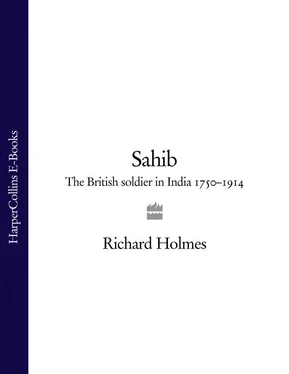The air, charged with sulphur, was stifling and so heated that it was almost unbearable. Now on rushed the Bengal European regiment with a determination which promised to carry everything before it; soon reaching the ditch which formed the outer defence, and springing into it, they found themselves confronted by massive walls, which in the distance had appeared less formidable, for now they found these works too high to escalade without ladders. To retire again was to encounter the storm of fire through which they had just passed, to remain in their present position was annihilation; therefore the Regiment, mortified and chagrined, was forced to seek shelter under cover of the bank of the dry river which it had left just a short time before. 19
Harry Smith ordered his division forward as soon as he received the order to attack. Captain Longworth, who ended the day commanding HM’s 31st, later reported that the advance:
was no sooner discovered by the enemy than they opened upon us a most tremendous fire of round shot from the whole of the guns upon the left flank of their entrenched camp; shell, grape, canister and a very heavy fire of musketry were showered upon us as we neared the fortifications – but in spite of this, I am proud to say, the regiment advanced steadily and in the best order till within thirty paces of the entrenched camp, when a most destructive fire from overpowering numbers forced us to retire for a short distance, for the purpose of re-forming, as we left a full third of the regiment on the ground … 20
The 50th sets off in the wake of the 31st, in a line two-deep, its commanding officer, Lieutenant Colonel Petit, with the colour party in the centre, captains on the right flank of their companies and sergeants and subalterns to the rear. 21Darby Fulcher marches just behind the centre of his company, smacking out the step with the steady drumbeat of ‘The Grenadiers’ March’, to which his comrades are entitled. The men are now stepping ‘uncommon stiff an’ slow’, with the straight-legged gait of fighting dogs, and are already walking over dead and wounded from the 31st. Some of these unfortunates still have fight left in them, and shout: ‘Come on, the old half-hundred! Pay them off for Mudki! Take the Brummagem to them, my darlings.’ 22The fire from the embankment just 300 yards ahead is simply prodigious, with yellow flashes piercing a wall of white smoke, a mass of metal whooping overhead, some roundshot clearly visible as they bound along, and gusts of grape kicking up the yellow earth and clipping holes in the line.
The men are dressing by the centre, glancing in occasionally to take station on the colours, and closing in to left or right as comrades are hit. Lieutenant Colonel Petit is still mounted (he had a horse shot under him at Mudki) and is in more danger at his height than he would be four feet lower, for a lot of the fire is going high. An officer will later admit that: ‘It is a miracle that we were not properly riddled, but … the guns had so sunk in the sand that the gunners could not depress the muzzles sufficiently, and therefore most of the grape went over our heads.’ 23Petit shouts something inaudible, raises his drawn sword and sweeps it down to the left. Almost immediately a ruffle ripples out from the centre as drummers relay the order, and captains shout: ‘By the left … left incline.’ The battalion begins to swing like a great gate, pivoting on the light company, on its left, whose men are scarcely moving, their sergeants hissing: ‘By the left … Step short, step short.’ The grenadiers, in contrast, have ground to make up, and stride out boldly. Petit is edging leftwards to avoid the worst of the carnage ahead, and when he is satisfied with the new alignment, his sword comes up. Another burst of drumming, and captains repeat: ‘By the centre … For … ward.’
The change of direction is little help. The ramparts are now only 100 yards ahead, and it is all too clear that the 31st has reached the end of its tether. Its commanding officer has been knocked from his horse by a flurry of grapeshot which has bent his sword double, and the regiment begins to drift backwards like tide ebbing from rocks, coming straight for the advancing line of the 50th. Lieutenant Colonel Petit’s sword-point comes up again. ‘50th … division into column … Quick march,’ he yells, and the drumbeats ripple out again. This time each of the companies swings from line into its own small column. Towards the end of his long life, Colour Sergeant Thompson still recalled the moment well:
The thing that impressed me most in the whole campaign, was the steadiness with which the 50th at Sobraon, formed fours under tremendous fire, to allow the 31st, who were retreating in disorder, to pass through their ranks, and then formed up as if on parade … You know how catching a panic is, and it struck me as a most trying ordeal. 24
With the survivors of the 31st safely through, the eight little columns close back into line at once. There are shrieks just ahead, for some Sikhs have dashed down to cut up the wounded in the ditch. At its very edge the 50th halts, fires a single volley at point-bank range – its men aiming for the embrasures and parapet – and then charges, not with the coarse bark of formal hurrahs, but with a dreadful, sobbing, throaty roar. The Sikhs, wholly undaunted, wave swords and muskets, and shriek out their own war-cry ‘Sat Sri Akal’. Some attackers scramble up the earthworks, jump through the embrasures and set about the gunners who, true to form, lash out with rammers and handspikes. But most edge to the right, along the ditch, and begin to fan out across a narrow strip of open ground between the northernmost bastion and the river. Lieutenant Colonel Petit is down, and command passes quickly amongst the captains as they too are hit.
Not that command means much now, with the regiment breaking up into little knots of men laying on with bayonet and butt. Most soldiers are giving clean, straight thrusts, as they have been taught, but some, in the passion of the moment, swing the bayonet upwards with ‘the haymaker’s lift’ that can carry a skewered opponent right off his feet. It is not a tactic to be recommended, for sometimes the bayonet snaps clean off, and this is no place to be defenceless. Sergeant Major Cantwell has just run a Sikh ensign through with his sword and seized his colour when he himself is cut down by a vicious blow from a tulwar (the Hindustani for sword): his body, stripped and gashed, will be found in the ditch at the end of the fighting.
The 31st has already recovered itself not far behind, and it too returns to the attack, quickly losing Lieutenant Tritton, who has carried the Queen’s colour and Ensign Jones, with the regimental colour. Lieutenant Noel picks up the fallen Queen’s colour, and pushes on round the edge of the earthworks, while Sergeant Bernard McCabe takes the regimental colour and plants it on the rampart. Harry Smith has fought in dozens of battles in his fifty-seven years, and won his Spanish bride, Juanita, on that dreadful night in April 1812 when Wellington’s army stormed the Spanish town of Badajoz. But what followed his division’s entry into the Sikh entrenchment exceeded anything he had ever seen:
And such a hand to hand contest ensued, for twenty-five minutes I could barely hold my own. Mixed together, swords and targets against bayonets, and a fire on both sides. I was never in such a personal fight for half the time, but my bull-dogs of the Thirty-first and old 50th stood up like men, well supported by the native regiments …
In another letter he wrote that: ‘The old Thirty-first and 50th laid on like devils. This last was a brutal bull-dog fight.’ 25
Although nobody on this part of the field has the least idea of it, the attackers have made good progress elsewhere, though at terrible cost. In the centre Gilbert is wounded and both his brigade commanders are dead, but at their third attempt his men have managed to get up onto the Sikh parapet by scrambling up on one another’s shoulders. There is movement on Gough’s left too, where Dick’s men are up on the rampart and beginning to seep down behind it. Whatever Gough’s limitations, he has an acute sense for the balance of a battle, and knows that this one has now begun to tilt his way. Part of Major General Sir Joseph Thackwell’s cavalry division is at hand, and he orders it forward. ‘It was now our turn,’ wrote John Pearman;
Читать дальше












